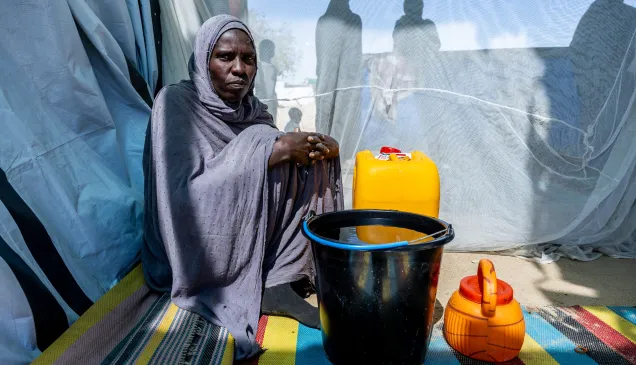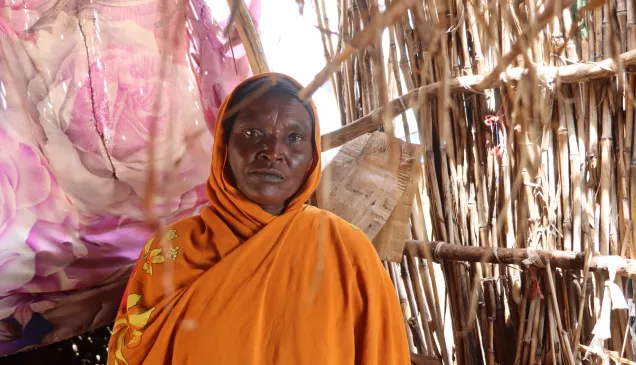Chad: Surviving against all odds
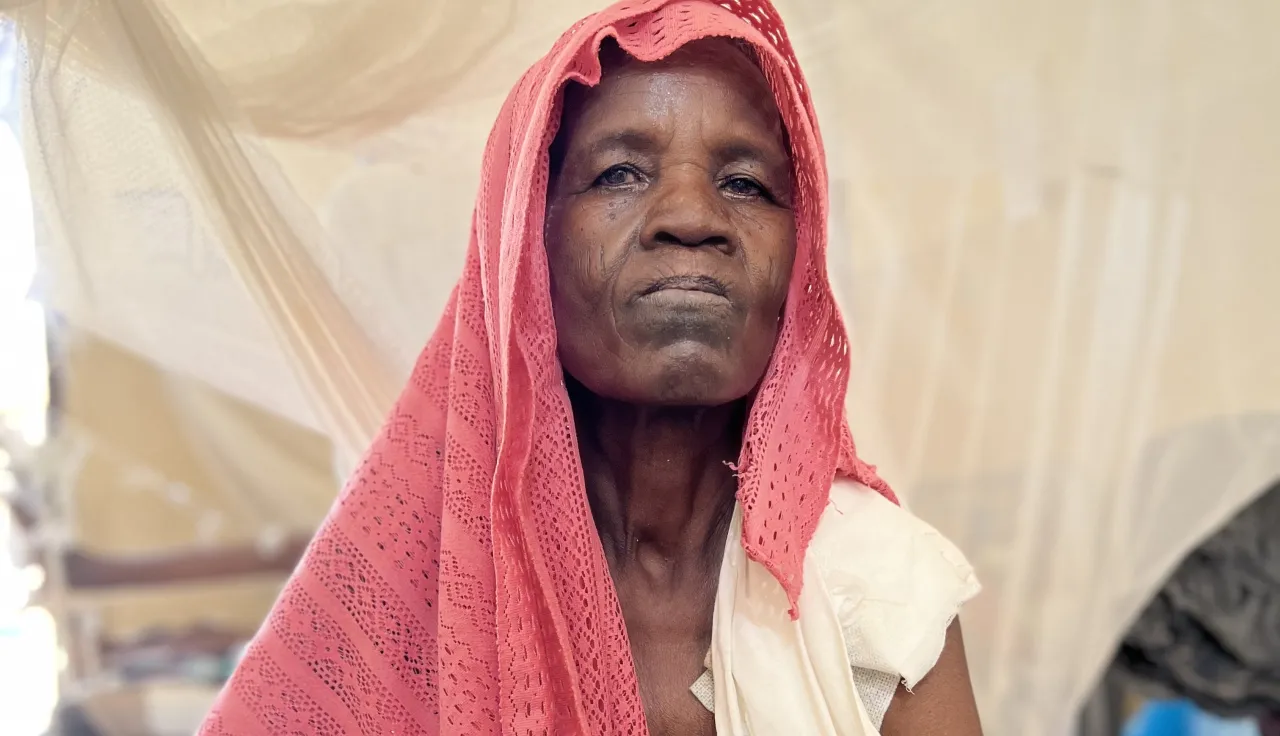
In July 2023, I was sent to eastern Chad to meet people who had fled Sudan on foot because of the violence. I spent two weeks in an ICRC-supported hospital with patients recovering from bullet wounds, hearing what they had to say. Through their stories I saw how incredibly cruel war is to those who cannot protect themselves. But I also saw how tremendously strong they were in their struggle to survive.
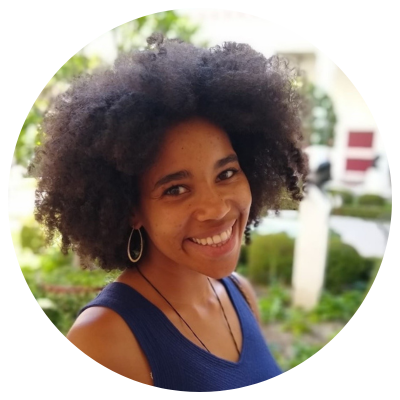 Eleonore Abena Kyeiwaa ASOMANI is Communications Officer for the International Committee of the Red Cross. In her own words, she looks back on her mission to eastern Chad in July 2023.
Eleonore Abena Kyeiwaa ASOMANI is Communications Officer for the International Committee of the Red Cross. In her own words, she looks back on her mission to eastern Chad in July 2023.
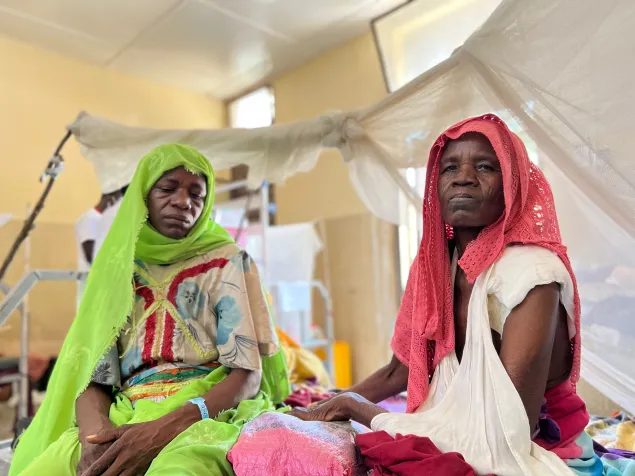
It was ten days before Achta and her remaining daughter reached Abéché Hospital.
Achta, a mother who was so numb from seeing her daughter die that she didn't feel the bullet in her arm
Achta is a 60-year-old Sudanese woman who, like so many others, saw her life turned upside down when violence erupted in her home country.
I didn't feel the pain of the bullet entering my flesh. I was too numb from seeing my daughter shot dead in front of me seconds before. Only when I saw blood did I realize I was wounded.
Achta recounted her journey to me from the safety of her hospital room in Abéché, in eastern Chad, where she and other civilians fleeing the conflict in Sudan had taken refuge only a few days before.
When I first entered the hospital, it was the smell that struck me first: sweat, infected wounds, urine.
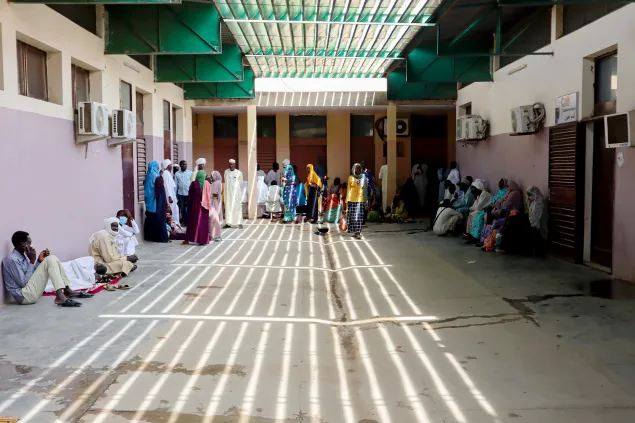
Abéché Hospital. Patients and their families wait their turn for consultations. They make do on the hospital's makeshift benches, or on mats they bring in anticipation of long waits.
The hospital was built in the 1970s with a capacity of 289 people. There must have been five times that many patients while I was there. Mothers and their newborns lined up on wooden benches outside overcrowded rooms, shifting uncomfortably, trying to rest. The delivery room, too, made an impression: the rusty pink chair darkened by stains was anything but welcoming. But it was there that the infants took their first breaths.
An ICRC medical team made up of two nurses, an anaesthetist, and a surgeon had arrived a week before me to treat wounded refugees arriving from Darfur, Sudan. They brought expertise and dedication to life-saving work, but the conditions were difficult. Frequent power cuts forced them to operate by the light of headlamps, as they would in makeshift hospitals in the bush. There was little clean water and medicine, and the lack of personnel meant they worked long hours.
The rooms where their patients convalesced after surgery had rows of identical metal-framed beds with thin black plastic mattresses. The yellowish walls with retro tiling gave the absurd impression that the room and the entire hospital were cold. The stifling air stirred by the ceiling fan reminded me otherwise. Thankfully, between the beds, relatives had set down colourful mats to sleep on and keep watch, adding a welcoming and homey touch.
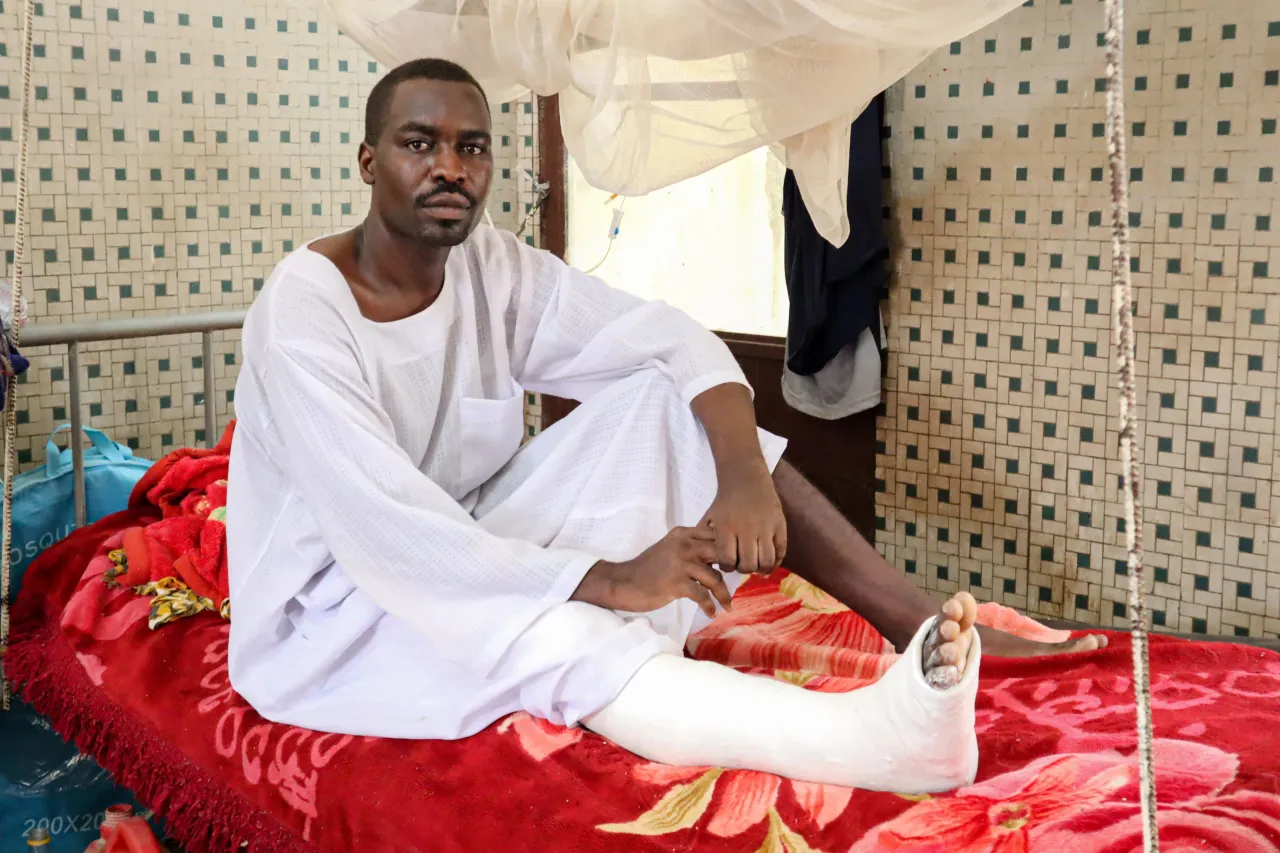
Before the outbreak of violence, Abdel Hakim was studying geography at university. Now recovering, he notes that, at 31, he has lived through more war than peace. The conflict in Darfur began in 2003 and officially ended in 2020, following the signing of a peace agreement.
Abdel – a young man who had to play dead to survive – now has nightmares about the corpses strewn along the roads of El Geneina
For many, reaching Chad was a welcome respite, but more of a rest stop than the end of their journey. Every single patient told me about a loved one who had gone missing or died. Our conversations often brought them back to their peaceful lives from before – as a bank agent, a university student, a shopkeeper. These were the very normal lives of the people I met. Today, they are struggling to recover from infected wounds, which can take months to heal.
Abdel told me that after he was wounded, he found refuge in a school, where he hid for two months with others from his neighbourhood. Many died from a lack of medical care and food. He escaped the town with other survivors and headed towards the border with Chad. On his way, an armed group attacked the car he was in. Since he was wounded, he played dead. It saved him. Everyone else was killed. After that, unable to walk, he crawled for nearly four kilometres until he found a village that would take him in.
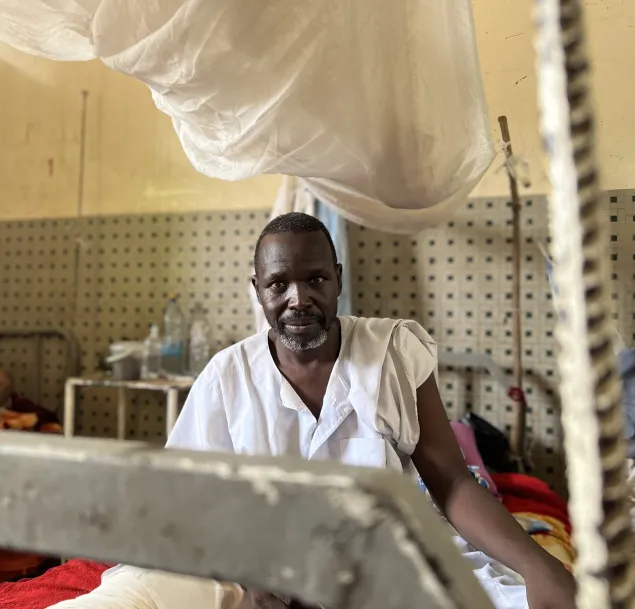
Idriss, a man who didn’t believe we’d remember his name.
Idriss, a man who didn't believe we'd remember his name
Idriss had worked transporting sand in the same town, El Geneina, where Abdel Hakim had been hiding. He was shot by a sniper when he was trying to escape. Someone lifted him to his feet, but then dropped him again and ran off. Landing hard, his already partially broken bone became badly broken. Three days passed before someone came to his rescue. When I took down his name, he confessed that it had been months since he'd heard someone say it in full. It meant a lot to him to see it in black and white – Idriss Yaya Anour Ahmed.
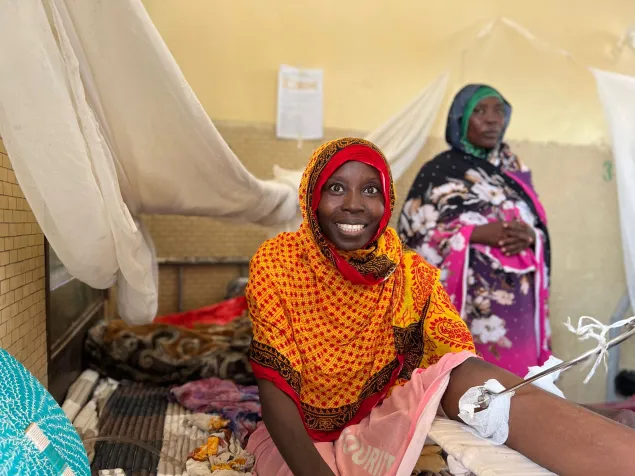
Niemat had been writing a book about the outbreak of violence in her hometown, but it was lost when she was shot and fled to Chad. She says she will start over.
Niemat, a mother whos knows that her son is dead
Niemat was the first patient on the left when you entered the women and children's room. We instantly connected as we both speak English. When I met her, she had already been lying in her hospital bed for 23 days, her hip fractured by a gunshot.
Her son had tried to lift her up where she fell, and she'd begged him to just save himself. With her wound, she was as good as dead, she'd said. But her son didn't leave her behind, and they managed to reach shelter. A week later, they were separated, and Niemat hasn't heard from him since. When I asked where she thought he might be, her reply gave me goose bumps – he's dead, she's sure of it.
Most patients had been wounded in the legs, condemning them to their now-familiar hospital beds. But it was Niemat who told me she was heartbroken to see Sihame and her two daughters sleeping on the floor because there weren't enough beds.
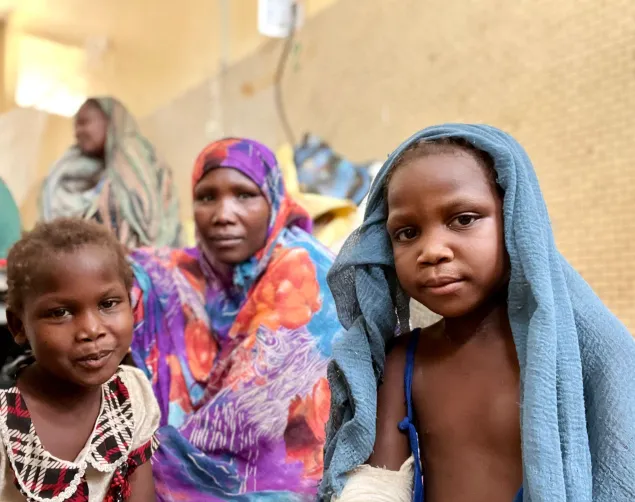
Sihame, the girls’ mother, left her four other children with her sister in Adré, on the border between Chad and Sudan.
Seven-year-old Naima and five-year-old Malak were shot in their home by armed men while their mother was at a neighbour's house. Only when Sihame ran outside screaming that there were children inside did the men leave. Sihame carried her girls over the border, determined to get them care.
Eventually, they reached Abéché Hospital and were treated by the ICRC medical team. Both girls had been hit in the arms not the legs, so they could at least wander around and get the attention of newcomers like me, playing and photobombing at every opportunity, like kids everywhere.
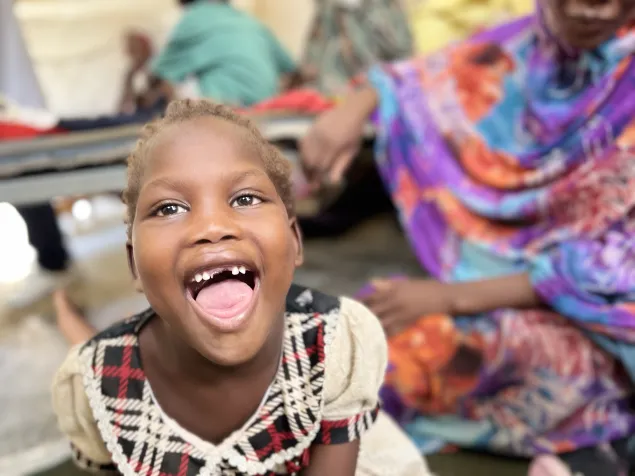
Malak posing.
Mansour and his brother, Mounir, who died on his mother's back
Mansour lay on the bed next to where Malak, Naima and their mother sleep. The three children had obviously become friends. I sat with Mansour's mother in the hospital courtyard as she told me what had happened. A shell had fallen on their house, wounding Mansour in the left leg and his ten-year-old brother, Mounir, in the stomach. As she carried Mounir on her back, desperately searching for medical care, his life had slipped away.
The air thickened as her tears fell to the ground.
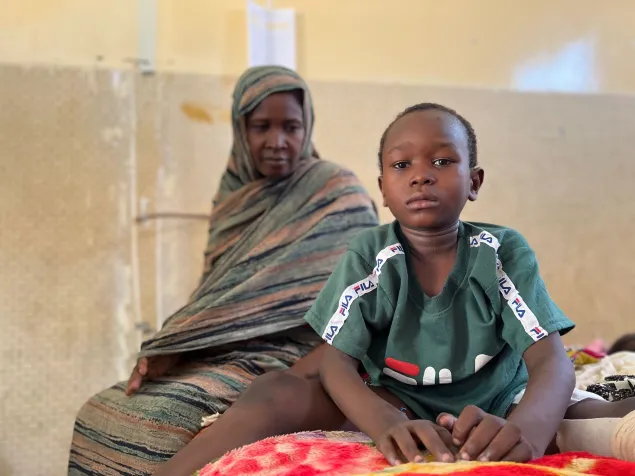
Mansour was wounded in a shell blast. His mother says their neighbourhood was hit by almost 30 shells.
The patients whose stories are told above remain in Abéché Hospital, still struggling but on the road to recovery. When asked what their biggest wish was once recovered, they all said they wanted to go home.
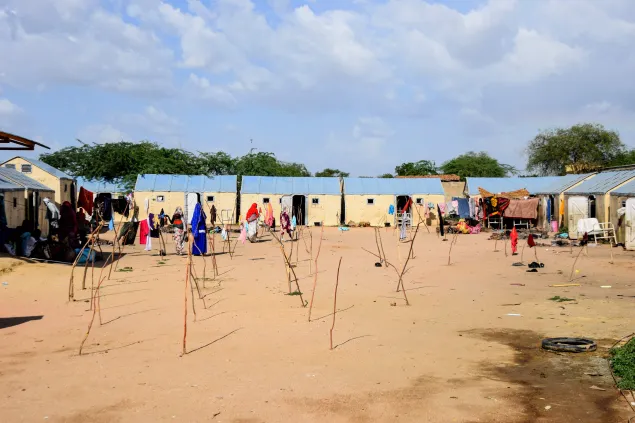
This refugee camp is just behind the hospital in Abéché. Many patients live there.
Note to readers: After July 2023, the fighting in El Geneina subsided and no new wounded patients were admitted to the ward, giving our teams some respite. More humanitarian services have since been made available in Adré, the border city and transit point between Sudan and Chad.

